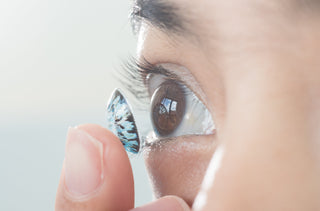Extended wear contact lenses are an attractive option for those seeking comfort and convenience. Designed to be worn day and night for several days or weeks, they take the hassle out of daily wear. But are they for everyone? What are the benefits and risks?
What are extended-wear lenses?
Unlike traditional lenses, which must be removed every night, extended-wear lenses are made from materials that are ultra-permeable to oxygen, enabling the cornea to “breathe” even during sleep. Some can be worn continuously for a week, or even up to 30 days, depending on the recommendations of the manufacturer and your optometrist.
The benefits of extended-wear lenses
Greater convenience: People with active lifestyles or demanding jobs can benefit from not having to handle their lenses every day.
Improved comfort: New generations of extended-wear lenses are designed with soft, highly permeable materials, reducing dry eye and irritation.
Ideal for certain professions: People working long hours, such as medical professionals, the military or night-shift workers, may find these lenses particularly convenient.
Risks and precautions
Increased risk of infection: Sleeping with lenses increases the risk of eye infections, such as microbial keratitis, which can be serious if not treated promptly.
Corneal hypoxia: Even though these lenses provide better oxygenation than conventional models, prolonged wear can still lead to oxygen deprivation, which can damage the cornea in the long term.
Lens deposits: Over time, proteins and lipids from tears can build up on the lens, reducing vision quality and increasing discomfort.
Tips for safe wear
- Consult your optometrist before opting for extended wear lenses to ensure they are suitable for your ocular health.
- Adhere to the recommended wearing time and never exceed the period indicated by the manufacturer.
- Ensure good hygiene and replace lenses as recommended.
- Watch out for signs of irritation or infection, such as redness, pain or blurred vision.
In the event of unusual symptoms, remove lenses immediately and consult an optometrist. Extended wear contact lenses offer valuable freedom, but they're not for everyone. It's essential to take a responsible approach to preserving the health of your eyes. Consult an optometrist to find out if they're right for you, and follow best practices for safe use.





















































